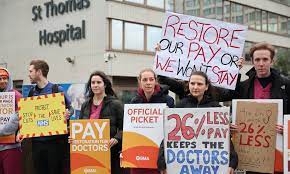In the midst of an ongoing salary dispute between doctors and the British government, senior doctors in England are expected to go on another 48-hour strike on Thursday.
In addition to the National Health Service’s warning that patients should expect significant disruption during the two-day strike, thousands of hospital doctors have announced that they will only offer emergency care.
As part of a wave of disruptive industrial action by public sector workers to seek better pay in the midst of the cost-of-living crisis in the UK, physicians, nurses, and other clinical personnel conducted their most recent strike on Thursday.
The most recent walkouts, according to Julian Hartley, CEO of NHS Providers, are a “massive headache” for the public health system because they coincide with the three-day public holiday weekend in late August when demand for hospital emergency rooms is normally higher. This effectively means that many services will not be available for five days.
Since announcing that senior doctors will receive a 6% salary increase, the Conservative administration has declared that negotiations over pay are done. According to Health Secretary Steve Barclay, senior doctors make an average of 134,000 pounds per year, in addition to a handsome pension.
The physicians’ organization, the British Medical Association, denounced the raise as “insulting” and claimed that during the previous 14 years, doctors’ real compensation had decreased by 35%. Many medical professionals claim that they feel forced to take action in order to bring attention to their subpar working circumstances.
We much like to be in the hospital with our patients. To the disadvantage of the NHS and patients, we cannot continue to be silently undervalued, undermined, and forced to watch colleagues quit, Dr. Vishal Sharma, a union leader, stated.
The British Medical Association announced that members would strike once more on September 19–20 and October 2-4.
A compensation dispute with the government is still ongoing between tens of thousands of junior doctors and those physicians who are still in the beginning phases of their careers. The administration reached separate agreements with the nurses’ unions earlier this year, as well as with other unions representing medical personnel, such as paramedics and ambulance drivers.

















